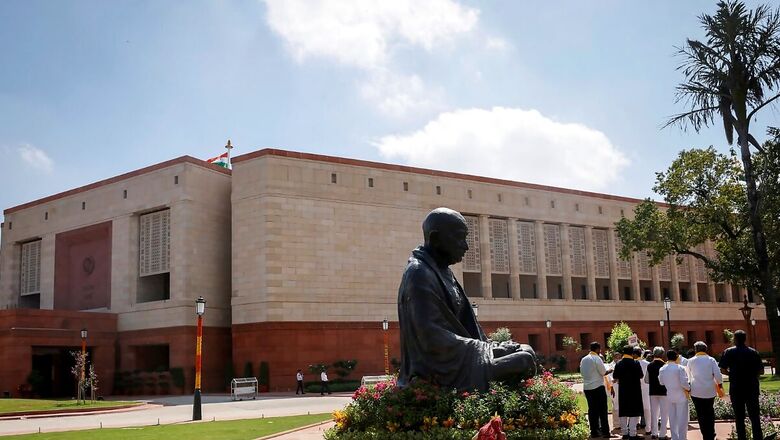
views
With close to 48 amendments, the Standing Committee for Home Affairs has finally adopted the draft report for three bills that will overhaul the country’s criminal justice system. The three bills — Bharatiya Nyaya Sanhita (BNS) Bill 2023, Bharatiya Nagarik Suraksha Sanhita (BNSS) Bill 2023 and the Bharatiya Sakshya (BS) Bill 2023 — were introduced in the Lok Sabha in the Monsoon Session to replace the Indian Penal Code, Criminal Procedure Code (CrPC) and Indian Evidence Act.
These were referred to the Standing Committee by Union Home Minister Amit Shah for scrutiny. The adoption of the reports had been postponed by a few days after Opposition MPs questioned the rush and demanded more time to speak.
Despite the request by Opposition MPs to seek an extension up to March 2024, the Brij Lal-led panel adopted the report on Monday. Out of 30 MPs in the panel, 16 are from the BJP and Rahul Shewale from the Eknath Shinde faction of the Shiv Sena is with the NDA. Two MPs in the panel from BJD and one from the YSRCP have often been seen siding with the government on various bills.
From the Opposition camp, out of the 10 MPs in the panel, four are from the Congress and two each are from the TMC, JDU and DMK. Former home minister P Chidambaram, TMC leader Derek O’Brien and DMK’s Dayanidhi Maran were among the MPs who had questioned the government’s haste in clearing the bills.
Members in the Opposition, especially from the DMK, have been opposing the Hindi name given to the bills. However, both the government as well as senior bureaucrats, who were present before the committee, have argued that it does not mean ‘Hindi imposition’. Opposition MPs Adhir Ranjan Chaudhary, Ravneet Bittu, NR Elango and Digvijaya Singh have so far submitted notes of dissent opposing the bills.
P Chidambaram, Derek O’Brien and Dayanidhi Maran will also be submitting notes of dissent. “All 10 opposition MPs will be giving their dissent notes. The time to submit these notes will be the next 48 hours. Former home minister Chidambaram wanted an extension of another day to submit the dissent notes as he had just spoken at length in the meeting about the bills,” an opposition MP told News18.
An MP from the ruling party reported cited rules and procedures that in order for a dissent note to be accepted, the concerned member needs to be present in the meeting on the day of the adoption of the report. Therefore, dissent notes of only four opposition MPs – P Chidambaram, NR Elango, Derek O’Brien and Dayanidhi Maran — would be valid.
Some of the points of dissent the opposition MPs will be raising include the name of the bills being in Hindi/Sanskrit. Even as the committee widely argues that this is not in violation of Article 348 of the Indian Constitution, opposition MPs continue to argue that this is in violation of linguistic feelings of Indians and a form of ‘Hindi imposition’ in non-Hindi speaking states.
The Opposition further contends that suggestions regarding the abolition of death sentence were not considered in the draft report, and insists that views of stakeholders and experts should be heard on the issue.
A wider consultative process with the state governments, judges, police authorities, Bar Council of India, state bar councils, advocates’ association, bar associations, senior advocates, advocates, women lawyers’ association, eminent jurists and academicians is important, the Opposition argues. It further contends that the cadre of Metropolitan Magistrate and the Assistant Sessions Judge shall not be done away with and they have to be retained.
After the Supreme Court struck down adultery, sources say this bill again proposes to criminalise adultery with gender-neutral phrasing. Some MPs have also questioned as to why despite having specific laws, the government trying to bring terrorism cases under a common law like the UAPA.
With more than 11 meetings to discuss the proposed legislations, the Standing Committee invited Home Secretary Ajay Bhalla, various officials of the Ministry of Home Affairs, former top police officers and legal experts to depose before it in the process to prepare the reports.
The Opposition MPs had given a list of 17 prominent personalities, including a former Chief Justice of India and lawyers to appear before the committee, out of which, allegedly only one lawyer was called to depose.
“Dandh (punishment) was the basis on which the colonial laws were made. However, the intent of the Modi government to bring these bills was very clear and that was for delivery of nyay (Justice) in a time-bound manner,” a source said.
Several amendments have been proposed in the bills, ranging from full stops and commas to phrasing of certain portion, which may even prompt the Union Government to come up with fresh bills. “Passing elaborate bills like this and passing the amendments proposed separately would be quite a headache and therefore it would be better to bring new bills,” a source told News18.




















Comments
0 comment